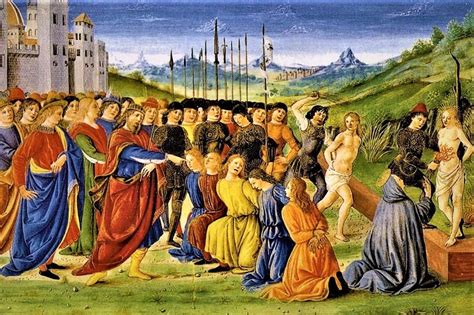
The Christian dying saviour who atones for his people was a development of Hebrew ideas but the Greek influence cannot be ignored either. In fact, the evidence suggests that the Greek idea was embraced by Hebrew authors. (This post is sharing a few pages from J. W. van Henten’s The Maccabean Martyrs As Saviours of the Jewish People: A Study of 2 and 4 Maccabees. I work with Henten’s date for the composition of 2 Maccabees as around 124 B.C.E.)
We read in 2 Maccabees 6:12-17 that the suffering of the Jewish people at the hands of Seleucid kings is a sign of God’s special love for his people. God seeks to discipline his people before their sins get too far out of hand. That’s not how he treats the gentiles. He lets their sins continue until the reach some ultimate height and presumably then they will really suffer.
12 Now I urge those who read this book not to be depressed by such calamities, but to recognize that these punishments were designed not to destroy but to discipline our people. 13 In fact, it is a sign of great kindness not to let the impious alone for long, but to punish them immediately. 14 For in the case of the other nations the Lord waits patiently to punish them until they have reached the full measure of their sins; but he does not deal in this way with us, 15 in order that he may not take vengeance on us afterward when our sins have reached their height. 16 Therefore he never withdraws his mercy from us. Although he disciplines us with calamities, he does not forsake his own people. 17 Let what we have said serve as a reminder; we must go on briefly with the story.
The martyrs who suffer do so not only for their own sins but primarily because of the sins of all their people. (The only sins mentioned are those of the Jewish traitors.) A mother and her seven sons are martyred one by one, and before the sixth son was taken to suffer a gruesome fate we read in 2 Maccabees 7:18 his words spoken to Antiochus:
18 After him they brought forward the sixth. And when he was about to die, he said, “Do not deceive yourself in vain. For we are suffering these things on our own account, because of our sins against our own God. Therefore astounding things have happened.

“These things” that are suffered embrace both the suffering of the martyrs and the afflictions of the whole nation.
The seventh son expressed the same in 2 Maccabees 7:32
32 For we are suffering because of our own sins.
The same phrase “our own sins” is again found in 10:4 after the restoration of the Temple and prayers are made expressing hope never to suffer again the same way for their sins:
4 When they had done this, they fell prostrate and implored the Lord that they might never again fall into such misfortunes, but that, if they should ever sin, they might be disciplined by him with forbearance and not be handed over to blasphemous and barbarous nations.
The seventh son’s last words (7:37-38) were a declaration that his and his brothers’ martyrdom would bring an end to the sufferings of their people:
37 I, like my brothers, give up body and life for the laws of our ancestors, appealing to God to show mercy soon to our nation and by trials and plagues to make you confess that he alone is God, 38 and through me and my brothers to bring to an end the wrath of the Almighty that has justly fallen on our whole nation.
Henten interprets the above passages as meaning that the martyrs are suffering as a result of the sins of all the Jews:
The pattern of the narrative . . . as well as certain remarks in 5:17-20 and 6:12-17 support this interpretation (cf. 4 Macc. 4:21). The wicked deeds of some Jewish leaders have led the whole people including the martyrs into a state of sin. This explains why the youngest brother can say at 2 Macc. 7:38 that the wrath of the Lord “has justly fallen on our whole nation”. The godless actions of Simon, Jason, Menelaus, Lysimachus, Alcimus and the unfaithful soldiers of Judas are the only sins of Jews reported in 2 Maccabees. Nowhere are the sins of the martyrs themselves mentioned. The martyrs . . . die because of the sins of the people and in this way show their solidarity with the people.
(Henten, 137)
The martyrs are acting on behalf of the entire people:
The references to “we”, “us” and “our” in 2 Macc. 7:16, 30, 32-33, 38 are intended to be inclusive; they point not only to the martyrs but also to the people. The youngest brother says in 7:30 to the Seleucid king that Moses has given the law of the Lord to “our ancestors”, thereby making the entire people responsible for keeping the Torah. In 2 Macc. 7:31, Antiochus is not called the adversary of the martyrs but of “the Hebrews”.
(Henten, 138)
The sufferings that the martyrs in chapter 7 speak of are the sufferings of “the entire Jewish people” as well as to the martyrs. Reconciliation will follow the short period of torment, as the last son makes clear:
33 And if our living Lord is angry for a little while, to rebuke and discipline us, he will again be reconciled with his own servants. . . . . 38 and through me and my brothers to bring to an end the wrath of the Almighty that has justly fallen on our whole nation.”
Immediately after the deaths of the seven sons and their mother the reconciliation begins. From chapter 8 the tide turns and Judas Maccabeus soundly defeats the army of Nicanor.
40 So he died in his integrity, putting his whole trust in the Lord. 41 Last of all, the mother died, after her sons. . . .
8 Meanwhile Judas, who was also called Maccabeus, and his companions secretly entered the villages and summoned their kindred and enlisted those who had continued in the Jewish faith, and so they gathered about six thousand. 2 They implored the Lord to look upon the people who were oppressed by all; and to have pity on the temple that had been profaned by the godless; 3 to have mercy on the city that was being destroyed and about to be leveled to the ground; to hearken to the blood that cried out to him; 4 to remember also the lawless destruction of the innocent babies and the blasphemies committed against his name; and to show his hatred of evil.
5 As soon as Maccabeus got his army organized, the Gentiles could not withstand him, for the wrath of the Lord had turned to mercy. 6 Coming without warning, he would set fire to towns and villages. He captured strategic positions and put to flight not a few of the enemy. 7 He found the nights most advantageous for such attacks. And talk of his valor spread everywhere.
The story flow leads the reader to understand that the martyrdoms were the turning point in God’s intervention and working through Judas Maccabeus to free the people from foreign domination.
This pattern is repeated when Razis kills himself to save his people — 2 Maccabees 14:37-46. Stabbing himself didn’t work, so he threw himself off a tower into the enemy below, but that didn’t work either, so he finally ripped out his entrails and flung them at his opponents. The following chapter sees Judas Maccabeus announcing to his troops a dream-sign from God (Jeremiah giving him a golden sword) with the only possible outcome, 15:27:
So, fighting with their hands and praying to God in their hearts, they laid low at least thirty-five thousand, and were greatly gladdened by God’s manifestation.
These stories of deaths that became turning points for the liberation of the Jews are core themes in 2 Maccabees. What was their source of inspiration?
[I]n 2 Macc. 7:37-38 classical and Hellenistic Greek vocabulary concerning the death for one’s fatherland (Hellas), home town, laws, friends, relatives or beloved131 is combined for the first time with conceptions about atonement in the Hebrew Bible . . . .
(Henten, 157)
The Greco-Roman influence
The devil is in the details of the vocabulary used. Continue reading “The Dying Saviour: Greek or Hebrew Origin?”
